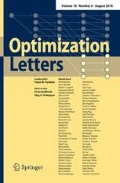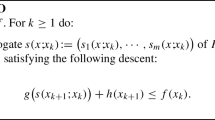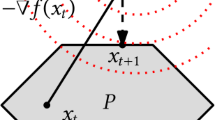Abstract
A new stochastic primal-dual algorithm for solving a composite optimization problem is proposed. It is assumed that all the functions / operators that enter the optimization problem are given as statistical expectations. These expectations are unknown but revealed across time through i.i.d realizations. The proposed algorithm is proven to converge to a saddle point of the Lagrangian function. In the framework of the monotone operator theory, the convergence proof relies on recent results on the stochastic Forward Backward algorithm involving random monotone operators. An example of convex optimization under stochastic linear constraints is considered.
Similar content being viewed by others
References
Atchadé, Y.F., Fort, G., Moulines, E.: On perturbed proximal gradient algorithms. J. Mach. Learn. Res. 18(1), 310–342 (2017)
Attouch, H.: Familles d’opérateurs maximaux monotones et mesurabilité. Annali di Matematica Pura ed Applicata 120(1), 35–111 (1979)
Bauschke, H.H., Borwein, J.M., Li, W.: Strong conical hull intersection property, bounded linear regularity, Jameson’s property (G), and error bounds in convex optimization. Math. Program. 86(1), 135–160 (1999)
Bauschke, H.H., Combettes, P.L.: Convex Analysis and Monotone Operator Ttheory in Hilbert Spaces. CMS Books in Mathematics/Ouvrages de Mathématiques de la SMC. Springer, New York (2011)
Bianchi, P.: Ergodic convergence of a stochastic proximal point algorithm. SIAM J. Optim. 26(4), 2235–2260 (2016)
Bianchi, P., Hachem, W.: Dynamical behavior of a stochastic forward–backward algorithm using random monotone operators. J. Optim. Theory Appl. 171(1), 90–120 (2016)
Bianchi, P., Hachem, W., Iutzeler, F.: A coordinate descent primal-dual algorithm and application to distributed asynchronous optimization. IEEE Trans. Autom. Control 61(10), 2947–2957 (2016)
Bianchi, P., Hachem, W., Salim, A.: A constant step forward-backward algorithm involving random maximal monotone operators. J. Convex Anal. 26(2), 397–436 (2019)
Brézis, H.: Opérateurs Maximaux Monotones et Semi-Groupes de Contractions dans les espaces de Hilbert. North-Holland Mathematics Studies. Elsevier, Burlington (1973)
Chambolle, A., Pock, T.: A first-order primal-dual algorithm for convex problems with applications to imaging. J. Math. Imaging Vis. 40(1), 120–145 (2011)
Combettes, P.L., Pesquet, J.-C.: Stochastic approximations and perturbations in forward–backward splitting for monotone operators. Pure Appl. Funct. Anal. 1(1), 13–37 (2016)
Combettes, P.L., Pesquet, J.-C.: Stochastic quasi-Fejér block-coordinate fixed point iterations with random sweeping ii: mean-square and linear convergence. Math. Program. 174(1), 433–451 (2019)
Combettes, P.L., Pesquet, J.-C.: Stochastic quasi-Fejér block-coordinate fixed point iterations with random sweeping. SIAM J. Optim. 25(2), 1221–1248 (2015)
Condat, L.: A primal-dual splitting method for convex optimization involving Lipschitzian, proximable and linear composite terms. J. Optim. Theory Appl. 158(2), 460–479 (2013)
Necoara, I., Richtarik, P., Patrascu, A.: randomized projection methods for convex feasibility problems: conditioning and convergence rates. arXiv:1801.04873, 2018
Ouyang, H., He, N., Tran, L., Gray, A.: Stochastic alternating direction method of multipliers. In: International Conference on Machine Learning, pp. 80–88, (2013)
Patrascu, A., Necoara, I.: Nonasymptotic convergence of stochastic proximal point algorithms for constrained convex optimization. J. Mach. Learn. Res. 18(198), 1–42 (2018)
Rockafellar, R.T., Wets, R.J.-B.: On the interchange of subdifferentiation and conditional expectations for convex functionals. Stochastics 7(3), 173–182 (1982)
Rockafellar, R.T., Wets, R.J.-B.: Variational analysis. Grundlehren der Mathematischen Wissenschaften [Fundamental Principles of Mathematical Sciences], vol. 317. Springer, Berlin (1998)
Rosasco, L., Villa, S., Vũ, B.C.: Stochastic inertial primal-dual algorithms. arXiv:1507.00852, (2015)
Toulis, P., Horel, T., Airoldi, E.M.: Stable robbins-monro approximations through stochastic proximal updates. arXiv:1510.00967, (2015)
Vũ, B.C.: A splitting algorithm for dual monotone inclusions involving cocoercive operators. Adv. Comput. Math. 38(3), 667–681 (2013)
Yu, H., Neely, M., Wei, X.: Online convex optimization with stochastic constraints. In: Advances in Neural Information Processing Systems, pp. 1427–1437, (2017)
Author information
Authors and Affiliations
Corresponding author
Additional information
Publisher's Note
Springer Nature remains neutral with regard to jurisdictional claims in published maps and institutional affiliations.
Rights and permissions
About this article
Cite this article
Bianchi, P., Hachem, W. & Salim, A. A fully stochastic primal-dual algorithm. Optim Lett 15, 701–710 (2021). https://doi.org/10.1007/s11590-020-01614-y
Received:
Accepted:
Published:
Issue Date:
DOI: https://doi.org/10.1007/s11590-020-01614-y




